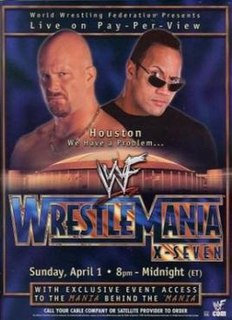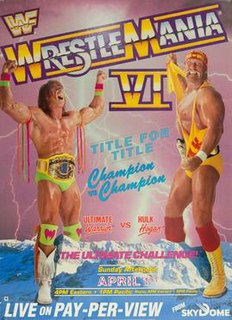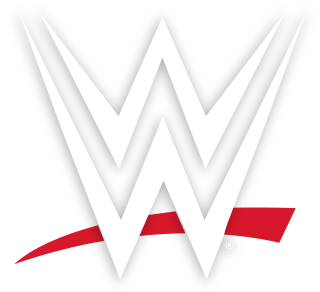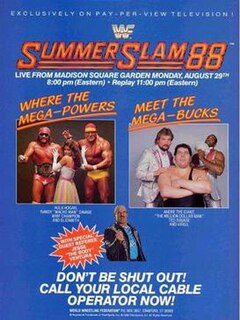
King of the Ring was a professional wrestling pay-per-view (PPV) and WWE Network event produced by WWE, a Connecticut-based professional wrestling promotion. The PPV event was held annually in June and was established in 1993 when the promotion was still called the World Wrestling Federation. It centered on the King of the Ring tournament, which had been held annually as a non-televised house show from 1985 to 1991, with the exception of 1990. During the event's run as a PPV, it was considered one of the promotion's five biggest events of the year, along with the Royal Rumble, WrestleMania, SummerSlam, and Survivor Series, dubbed the "Big Five." The 2002 event was the final King of the Ring produced as a PPV. To coincide with the brand extension introduced earlier that same year, the 2002 event featured wrestlers from both the Raw and SmackDown! brand divisions. In 2003, the event's PPV slot was replaced by Bad Blood.
WWE Backlash, known as WrestleMania Backlash since 2021, is a professional wrestling event that is produced by WWE, a professional wrestling promotion based in Connecticut. It is broadcast live and available only through pay-per-view (PPV) and the online streaming services Peacock and the WWE Network. The event was established in 1999 and was the first monthly PPV held after the discontinuation of the original In Your House shows, which were monthly PPVs held between the promotion's "Big Five" PPVs at the time: Royal Rumble, WrestleMania, King of the Ring, SummerSlam, and Survivor Series. The inaugural Backlash had been originally advertised as an In Your House show, but the branding was dropped before the event took place.

SummerSlam is a professional wrestling live event, produced annually since 1988 by WWE, the world's largest professional wrestling promotion. Dubbed "The Biggest Party of the Summer", it is considered WWE's second biggest event of the year behind their flagship event, WrestleMania. It is also considered one of the company's five biggest pay-per-view (PPV) events of the year, along with WrestleMania, Royal Rumble, Survivor Series, and Money in the Bank, referred to as the "Big Five". In addition to PPV, the event has aired on the WWE Network since 2014 and Peacock since 2021.

WrestleMania 18 was the 18th annual WrestleMania professional wrestling pay-per-view (PPV) event produced by the World Wrestling Federation. It took place on March 17, 2002, at the SkyDome in Toronto, Ontario, Canada, the second WrestleMania at that venue after WrestleMania VI in April 1990. The event marked the final WrestleMania event held under the WWF name and the Attitude Era, as the company was renamed to World Wrestling Entertainment (WWE) in May and entered the Ruthless Aggression Era later that year. It was also the last WrestleMania held before the introduction of the brand extension just a week after the event. The record-breaking attendance for the SkyDome of 68,237 grossed approximately $6.1 million CAD. WrestleMania weekend also included WWF Fan Axxess at the Canadian National Exhibition's Automotive Building.

WrestleMania 17 was the 17th annual WrestleMania professional wrestling pay-per-view (PPV) event produced by the World Wrestling Federation. It took place on April 1, 2001, at the Reliant Astrodome in Houston, Texas. It was the first WrestleMania held in the state of Texas. Twelve matches were contested at the event, including one broadcast exclusively on the Sunday Night Heat pre-show.

WrestleMania VI was the sixth annual WrestleMania professional wrestling pay-per-view (PPV) event produced by the World Wrestling Federation. It took place on April 1, 1990, at SkyDome in Toronto, Ontario, Canada, marking the first WrestleMania to be held outside of the United States. The event had an announced attendance of 67,678, which was a record for the Skydome at the time.

Howard Finkel was an American professional wrestling ring announcer, best known for his appearances in WWE. He began working for Vincent J. McMahon's World Wide Wrestling Federation (WWWF) in 1975, and was a Madison Square Garden ring announcer since 1977. Finkel was WWE's longest-serving employee and was widely regarded as the greatest ring announcer of all time. He was inducted into the WWE Hall of Fame in 2009.

The Wrestling Classic was a professional wrestling pay-per-view event produced by the World Wrestling Federation. It took place on November 7, 1985, at the Rosemont Horizon in Rosemont, Illinois in the United States. It was the promotion's second ever pay-per-view.

WWE Road to WrestleMania X8 is a professional wrestling video game released on the Game Boy Advance handheld console by THQ in 2002, based on WWE's 2002 pay-per-view WrestleMania X8. The game featured improved gameplay and grappling techniques compared to its predecessors. This game was the Game Boy Advance successor to WWF Road to WrestleMania from 2001 and was succeeded by WWE Survivor Series in 2004. It was one of two games named after the event, the other being WWE WrestleMania X8 for the GameCube, released five months prior in June 2002. Of the three WWE games developed by Natsume for the Game Boy Advance, WWE Road to WrestleMania X8 was the most successful in regard to both sales and reviews.
WWF WrestleMania may refer to:

WWE Home Video is a video distribution and production company that distributes WWE programming. A division of WWE formed on April 16, 1997 as WWF Home Video, it replaced a similar independent company owned by Evart Enterprises, Coliseum Video, which operated between 1985 and 1997.

The history of WWE dates back to the early 1950s when it was founded in 1953 as Capitol Wrestling Corporation (CWC). It underwent several name changes throughout the years, from CWC to World Wide Wrestling Federation (WWWF) in 1963 to World Wrestling Federation (WWF) in 1979, and to World Wrestling Entertainment (WWE) in 2002. In 2011, it has branded itself solely as WWE.

The 1988 SummerSlam was the inaugural SummerSlam professional wrestling pay-per-view (PPV) event produced by the World Wrestling Federation. It took place on August 29, 1988, at Madison Square Garden in New York City, New York. The pay-per-view was created to help the company compete against rival promotion World Championship Wrestling. It was one of the first four annual pay-per-view events produced by the WWF, along with WrestleMania, the Royal Rumble, and Survivor Series, which were eventually dubbed the "big four".

The 1997 Survivor Series was the 11th annual Survivor Series professional wrestling pay-per-view (PPV) event produced by the World Wrestling Federation. It was presented by Milton Bradley's Karate Fighters. The event took place on November 9, 1997, at the Molson Centre in Montreal, Quebec, Canada. The tagline "Gang Rulz" refers to the various wrestling stables that feuded with each other coming to this event. Seven matches were contested on the event's card.

WWE Tagged Classics was a series of two-disc DVD sets produced by Silver Vision and World Wrestling Entertainment for retail markets in Region 2 in PAL format. The majority of sets in the series feature a WWF/E pay-per-view event from one year on one disc, "tagged" with another disc that featured the same event from the following year, or two consecutive pay-per-views. The first Tagged Classics DVD set released was WrestleMania 1 and 2 in 2004 and the last to be released was UK Fan Favourites 1993 & 1995 in 2012.

In Your House was the inaugural In Your House professional wrestling pay-per-view (PPV) event produced by the World Wrestling Federation. The event took place on May 14, 1995, at the Onondaga County War Memorial in Syracuse, New York. The In Your House series was established to be held as monthly PPVs to take place between the WWF's "Big Five" PPVs at the time: WrestleMania, King of the Ring, SummerSlam, Survivor Series, and Royal Rumble.

The 2002 Backlash was the fourth Backlash professional wrestling pay-per-view (PPV) event produced by the World Wrestling Federation. It was held for wrestlers from the promotion's Raw and SmackDown! brand divisions. The event took place on April 21, 2002, at Kemper Arena in Kansas City, Missouri—it was the first event to be held at Kemper Arena since Over the Edge in May 1999, in which Owen Hart, competing as The Blue Blazer, died after falling 78 feet from a harness to the ring. It was the company's very first PPV held following the introduction of the brand split. It was the third consecutive Backlash presented by Castrol GTX and the final Backlash held under the WWF name as the promotion was renamed to World Wrestling Entertainment (WWE) the following month. The concept of the pay-per-view was based around the backlash from WrestleMania X8.

The 1999 Backlash was the inaugural Backlash professional wrestling pay-per-view (PPV) event produced by the World Wrestling Federation. It took place on April 25, 1999, at the Providence Civic Center in Providence, Rhode Island and was presented by Castrol GTX. The event had originally been promoted as "Backlash: In Your House", but the branding was dropped as the WWF discontinued the In Your House series before Backlash was held. As a result, Backlash was the first non-In Your House monthly PPV held by the promotion outside of their five major events at the time. The concept of the pay-per-view was based around the backlash from WWF's flagship event, WrestleMania.

The 2000 Backlash was the second Backlash professional wrestling pay-per-view (PPV) event produced by the World Wrestling Federation. It took place on April 30, 2000, at the MCI Center in Washington, D.C. Nine professional wrestling matches were scheduled on the event's card. The concept of the pay-per-view was based around the backlash from WrestleMania 2000.

The 2001 Backlash was the third Backlash professional wrestling pay-per-view (PPV) event produced by the World Wrestling Federation. It took place on April 29, 2001, at the Allstate Arena in the Chicago suburb of Rosemont, Illinois and was presented by Castrol GTX. Seven professional wrestling matches were scheduled on the event's card. The concept of the pay-per-view was based around the backlash from WrestleMania X-Seven.
















